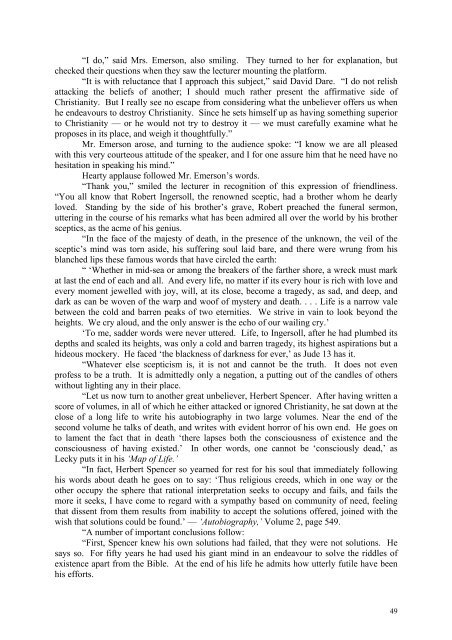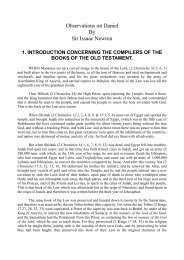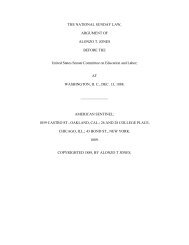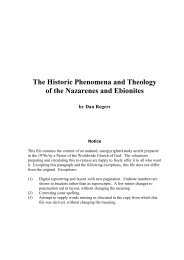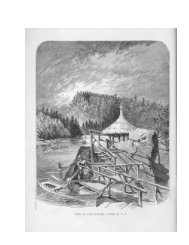Prophecy Speaks (E.A.Rowell).pdf
Prophecy Speaks (E.A.Rowell).pdf
Prophecy Speaks (E.A.Rowell).pdf
You also want an ePaper? Increase the reach of your titles
YUMPU automatically turns print PDFs into web optimized ePapers that Google loves.
“I do,” said Mrs. Emerson, also smiling. They turned to her for explanation, but<br />
checked their questions when they saw the lecturer mounting the platform.<br />
“It is with reluctance that I approach this subject,” said David Dare. “I do not relish<br />
attacking the beliefs of another; I should much rather present the affirmative side of<br />
Christianity. But I really see no escape from considering what the unbeliever offers us when<br />
he endeavours to destroy Christianity. Since he sets himself up as having something superior<br />
to Christianity — or he would not try to destroy it — we must carefully examine what he<br />
proposes in its place, and weigh it thoughtfully.”<br />
Mr. Emerson arose, and turning to the audience spoke: “I know we are all pleased<br />
with this very courteous attitude of the speaker, and I for one assure him that he need have no<br />
hesitation in speaking his mind.”<br />
Hearty applause followed Mr. Emerson’s words.<br />
“Thank you,” smiled the lecturer in recognition of this expression of friendliness.<br />
“You all know that Robert Ingersoll, the renowned sceptic, had a brother whom he dearly<br />
loved. Standing by the side of his brother’s grave, Robert preached the funeral sermon,<br />
uttering in the course of his remarks what has been admired all over the world by his brother<br />
sceptics, as the acme of his genius.<br />
“In the face of the majesty of death, in the presence of the unknown, the veil of the<br />
sceptic’s mind was torn aside, his suffering soul laid bare, and there were wrung from his<br />
blanched lips these famous words that have circled the earth:<br />
“ ‘Whether in mid-sea or among the breakers of the farther shore, a wreck must mark<br />
at last the end of each and all. And every life, no matter if its every hour is rich with love and<br />
every moment jewelled with joy, will, at its close, become a tragedy, as sad, and deep, and<br />
dark as can be woven of the warp and woof of mystery and death. . . . Life is a narrow vale<br />
between the cold and barren peaks of two eternities. We strive in vain to look beyond the<br />
heights. We cry aloud, and the only answer is the echo of our wailing cry.’<br />
‘To me, sadder words were never uttered. Life, to Ingersoll, after he had plumbed its<br />
depths and scaled its heights, was only a cold and barren tragedy, its highest aspirations but a<br />
hideous mockery. He faced ‘the blackness of darkness for ever,’ as Jude 13 has it.<br />
“Whatever else scepticism is, it is not and cannot be the truth. It does not even<br />
profess to be a truth. It is admittedly only a negation, a putting out of the candles of others<br />
without lighting any in their place.<br />
“Let us now turn to another great unbeliever, Herbert Spencer. After having written a<br />
score of volumes, in all of which he either attacked or ignored Christianity, he sat down at the<br />
close of a long life to write his autobiography in two large volumes. Near the end of the<br />
second volume he talks of death, and writes with evident horror of his own end. He goes on<br />
to lament the fact that in death ‘there lapses both the consciousness of existence and the<br />
consciousness of having existed.’ In other words, one cannot be ‘consciously dead,’ as<br />
Lecky puts it in his ‘Map of Life.’<br />
“In fact, Herbert Spencer so yearned for rest for his soul that immediately following<br />
his words about death he goes on to say: ‘Thus religious creeds, which in one way or the<br />
other occupy the sphere that rational interpretation seeks to occupy and fails, and fails the<br />
more it seeks, I have come to regard with a sympathy based on community of need, feeling<br />
that dissent from them results from inability to accept the solutions offered, joined with the<br />
wish that solutions could be found.’ — ‘Autobiography,’ Volume 2, page 549.<br />
“A number of important conclusions follow:<br />
“First, Spencer knew his own solutions had failed, that they were not solutions. He<br />
says so. For fifty years he had used his giant mind in an endeavour to solve the riddles of<br />
existence apart from the Bible. At the end of his life he admits how utterly futile have been<br />
his efforts.<br />
49


